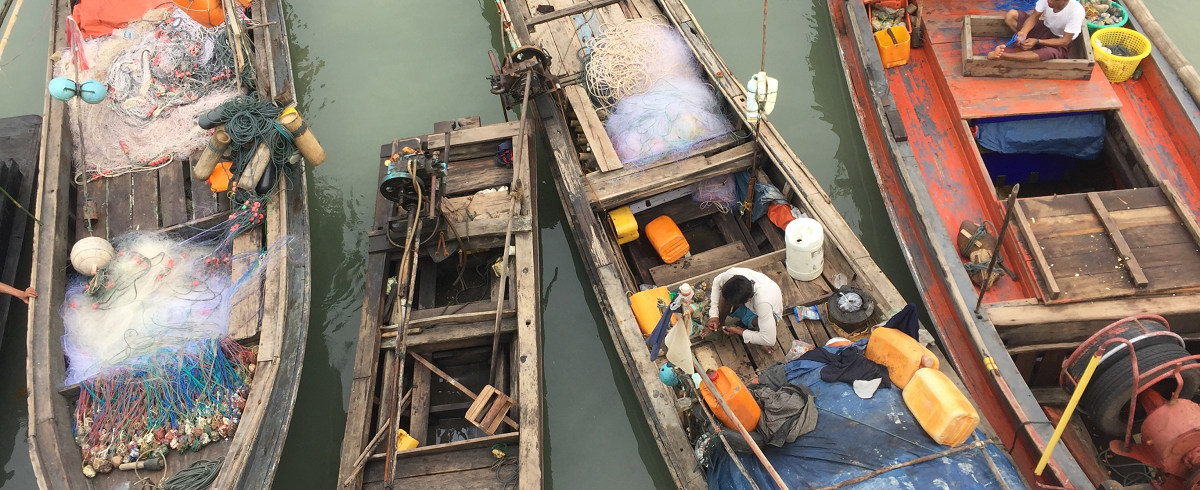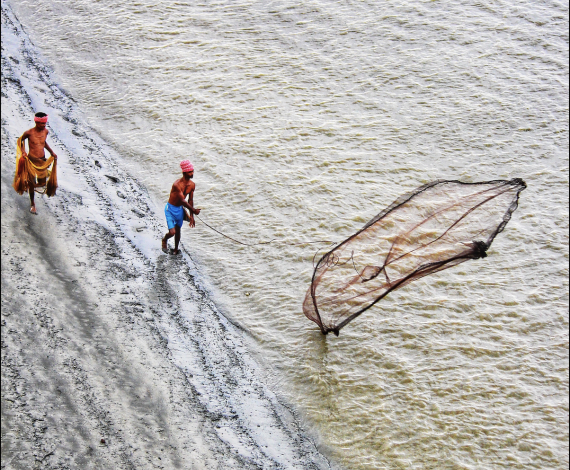
-

What are small-scale fisheries?
According to the Food and Agricultural Organization, "Artisanal, or small-scale fisheries, are traditional fisheries involving fishing households (as opposed to commercial companies), using relatively small amount of capital and energy, relatively small fishing vessels (if any), making short fishing trips, close to shore, and mainly for local consumption. They can be for subsistence or commercial." However, there is no single definition that is able to capture the diversity and complexity of what constitutes small-scale fisheries.
Small-scale fisheries play a critical role in the livelihoods of millions of people around the world. This sub-sector is diverse and dispersed - small-scale fisheries operate across the globe in both marine and inland ecosystems. They serve as the backbone of local economies and are deeply rooted in cultural traditions and connection to place. Despite their importance to livelihoods, food security and nutrition, small-scale fisheries are frequently overlooked by policy makers and undervalued and unrecognized by society.
In 2023, the FAO, Duke University, and WorldFish published their report "Illuminating Hidden Harvests," a comprehensive study that analyzes the global importance of small-scale to sustainable development and food security.
Some of the key findings from the report:
- Small-scale fisheries produce 37 million tons of aquatic foods each year, roughly 40 percent of the global catch.
- In 2016, an estimated 492 million people were at least partially dependent on small-scale fisheries for their livelihoods. The 60 million with full- or part-time jobs in small-scale fisheries account for 90 percent of total fisheries employment worldwide.
- Approximately four of every 10 people engaged in small-scale fisheries through direct employment or subsistence fishing are women.
- Fish are rich in micronutrients that are essential for good health and development.
- Co-management between communities and governments is perceived to be implemented for 20 percent of the small-scale fisheries catch.
Recognizing the contributions of small-scale fishers is critical as countries work to adapt to climate change and meet the challenges of a growing population. Small-scale fisheries are essential to success: they are an integral part of food systems and local economies, however, small-scale fishers are some of the most vulnerable groups to watershed and coastal changes.
The Voluntary Guidelines for Securing Sustainable Small-Scale Fisheries offers a path forward for sustainable fisheries and sustainable development.
The United Nations General Assembly has declared 2022 the International Year of Artisanal Fisheries and Aquaculture (IYAFA 2022). “IYAFA 2022 aims to focus world attention on the role that small-scale fisheries, fish farmers and fish workers play in food security and nutrition, poverty eradication and sustainable natural resource use - thereby increasing global understanding and action to support them.”
Learn more here: IYAFA 2022
Learn More...
A number of other platforms and networks, many of whose resources can be found within the Resource Library, exist that provide a wealth of additional resources, research, and news of particular interest to small-scale fisheries. Below are a few of these platforms and what you can find there.
- Visit ICSF to sign up for Samudra news alerts
- “The International Collective in Support of Fishworkers (ICSF) is an international non-governmental organization that works towards the establishment of equitable, gender-just, self-reliant and sustainable fisheries, particularly in the small-scale, artisanal sector.”
- The Samudra Report is the triannual journal of ICSF.
- FAO SSF Guidelines News
- Reports and stories on small-scale fisheries from across the globe.
- SSF Hub Newsletter
- Stay up to date with the latest news on the SSF Hub by signing up to the SSF Hub Newsletter
- Visit Too Big To Ignore
- Too Big To Ignore is a global research network and knowledge mobilization partnership that focuses on addressing issues and concerns affecting viability and sustainability of small-scale fisheries.
- Visit WorldFish
- “WorldFish is an international, nonprofit research organization that harnesses the potential of fisheries and aquaculture to reduce hunger and poverty.”
- Visit Sea Around Us
- Sea Around Us presents “fisheries and fisheries-related data at spatial scales that have ecological and policy relevance.”
- Visit Information System on Small-scale Fisheries (ISSF)
- ISSF is an interactive repository of information that helps you learn about SSF around the world. Explore and export data, maps, and profiles of different SSF.
- Visit FishBase
- FishBase is a global biodiversity information system on finfishes. Explore information on over 33,000 fish species.
- Visit FishNutrients
- FishNutrients is part of the FishBase database, it predicts the nutrient composition of finfish species to develop fish nutrient profiles that can be used to inform national dietary guidelines and aquatic resource governance.
- Visit SAFET
- SAFET brings together technologists, fishery stakeholders, NGOs, and government to utilize technology and resolve the biggest challenges in seafood and fisheries.
"A legal and policy database on small-scale fisheries that contributes to the implementation of the Voluntary Guidelines for Securing Sustainable Small-Scale Fisheries in the Context of Food Security and Poverty Eradication."
- FAOLEX Database
- "FAOLEX is a comprehensive and up-to-date legislative and policy database, one of the world's largest online repositories of national laws, regulations and policies on food, agriculture, and natural resources management.” To find fisheries and aquaculture laws and regulations from a specific country, start here.
